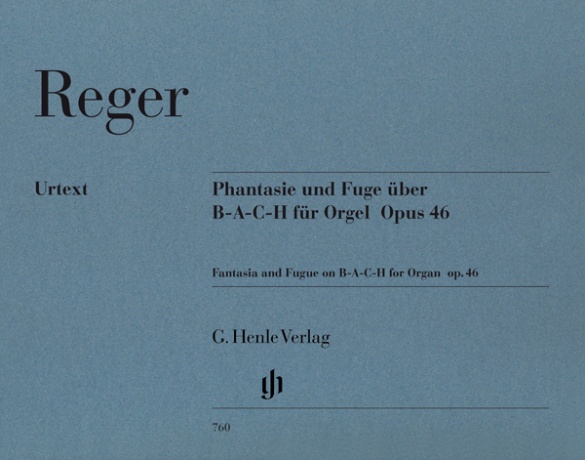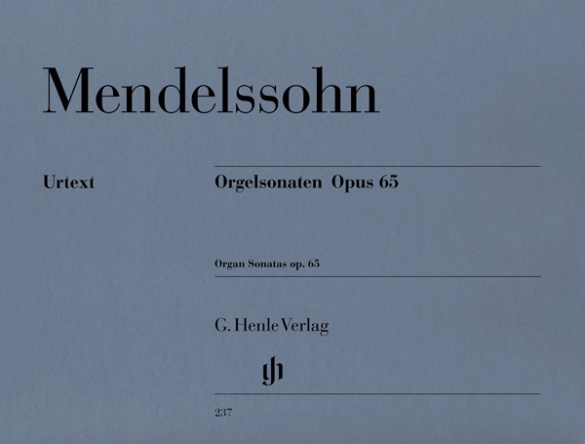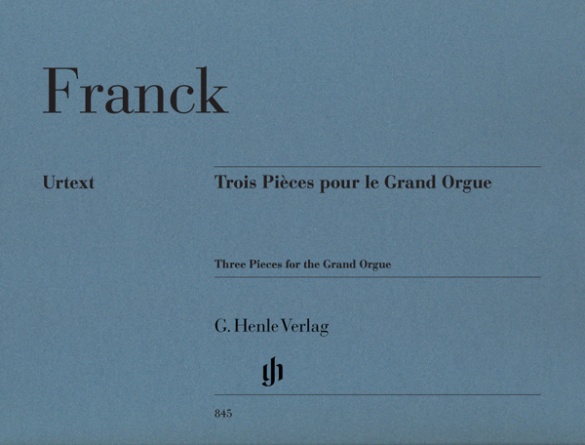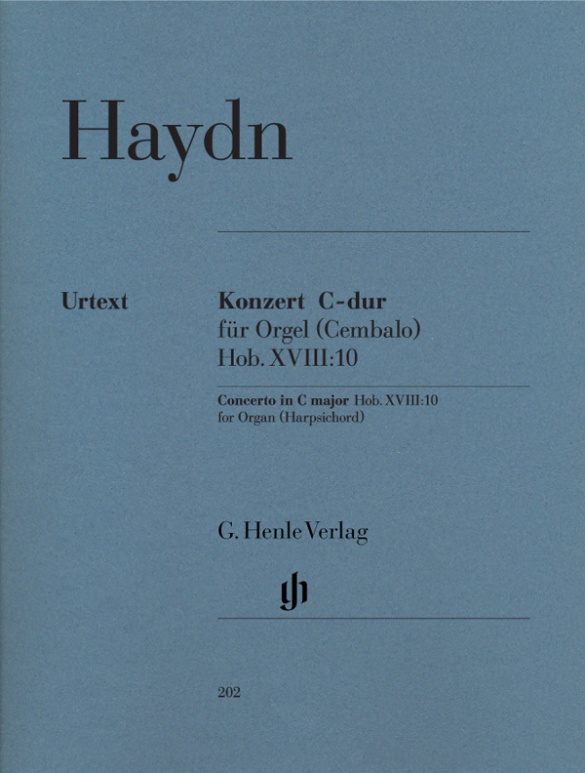

Joseph Haydn
Organ Concerto C major Hob. XVIII:10 (First Edition)
Joseph Haydn left five organ concerti to posterity. Their genesis can only be approximately determined, but is probably datable to the 1750s, when Haydn was still active, inter alia, as organist to Count Haugwitz. The C major Concerto Hob. XVIII: 10, transmitted only in one single manuscript, was not rediscovered until the 1960s and first published by the Henle Urtext edition in 1969. In the sole surviving manuscript, the solo instrument is identified as a harpsichord, but various criteria unequivocally suggest that it was intended for the organ. It belongs to the type of brief, easily playable solo concerto with string accompaniment.
Content/Details
About the Composer
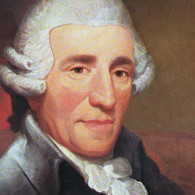
Joseph Haydn
His immense oeuvre documents the profound changes in music history during the second half of the eighteenth century, leading to the emancipation of instrumental music. His most important genres are the symphony and the string quartet, where he cultivated the technique of motivic-thematic development; he made significant contributions to the instrumental concerto and to piano music; during the last years of his life, he composed his great oratorios. Opera and art song take on a rather subordinate significance.
| 1732 | Born in Rohrau, probably on March 31 (baptized on April 1). |
| 1737 or 1738 | His uncle Johann Mathias Franck takes him in, in order to oversee his musical education. |
| around 1739/40 | For about 8–10 years, chorister at St. Stephen’s Cathedral in Vienna. |
| from 1750 | He makes his living as a musician, teacher, and composer. |
| 1757–61 | Employed as music director by Count Morzin. He makes a name for himself as a composer: fifteen symphonies, piano sonatas, trios, divertimenti, string trios, wind partitas, string quartets Opp. 1 and 2. |
| 1761 | “Times of Day” Symphonies Nos. 6–8: “Le matin,” “Le midi,” “Le soir.” |
| from 1761 | Employed by Prince Paul Anton at the Esterházy court, by Prince Nikolaus from 1762, by Paul Anton II from 1790–96, then by Nikolaus II, first as vice-Kapellmeister, then as Kapellmeister after 1766. |
| 1764–65 | Symphonies No. 22 in E-flat major, “Philosopher”; No. 30 in C major, “Alleluia”; and No. 31 in D major, “Hornsignal.” |
| 1766 | Prince Nikolaus Esterházy demands operas for the theater in his newly erected castle. Haydn’s operas are written primarily for special occasions, e.g., “La Canterina,” for the Kaiser’s visit in 1766. He composes many baryton pieces for Prince Nikolaus. |
| 1766–74 | Eighteen symphonies, including “La passione” in F minor (1768), “Lamentatione” in D minor (1770), “The Schoolmaster” in E-flat major (1774), “Trauer” (“Mourning”) in E minor (1772): expanded expressive range (six are in minor keys), more counterpoint. |
| 1768 | Premiere of “Lo speziale” on Goldoni’s libretto for the inauguration of the new opera house at Eszterháza. |
| 1770 | Premiere of the dramma giocoso “Le pescatrici.” After a ten-year hiatus, he writes the pioneering string quartets “6 Divertimenti” Op. 9, and Op. 17 (1771). |
| 1771 | Piano Sonata No. 20 in C minor. |
| 1772 | “Farewell Symphony” No. 45 in F-sharp minor, “6 Divertimenti (‘Sun Quartets’),” Op. 20, which are characterized by contrapuntal techniques (some have fugues as final movements). |
| 1775 | Premiere of the opera “L’incontro improvviso.” |
| around 1775–78 | “Missa brevis sancti Joannis de Deo (‘Little Organ Mass’).” |
| 1776 | Prince Nikolaus calls for regular opera performances at Eszterháza. Haydn adjusts works imported from Vienna or Italy to the local taste. He moves from Eisenstadt to Castle Eszterháza, where he resides for ten months a year. Little instrumental music after 1776, often with integrated opera music. |
| 1777 | Premiere of “Il mondo della luna,” after Goldoni. |
| 1779 | Contact with the publisher Artaria, who distributes his compositions over the following decade. |
| 1781 | Premiere of the opera “La fedeltà premiata.” Missa Cellensis, “Mariazellermesse”; String Quartets, Op. 33 (‘Russian Quartets’), which are written “in a quite new and special way” (Haydn) after a rather long break in composing quartets and regarded as paradigmatic for Haydn’s “wit” in the sense of his playful engagement with the instruments. |
| 1782 | Premiere of “Orlando paladino.” He begins selling his compositions abroad as well; he has the Symphonies Nos. 76–78 and 79–81 (1783–84) printed in Paris. |
| 1783 | Cello Concerto in D major (Hob. VIIb: 2). |
| 1784 | Premiere of “Armida”; from this point he composes no more operas for the court. Piano Concerto in D major. |
| 1785–86 | Commission by Count d’Ogny to write six symphonies (the Paris Symphonies, Nos. 82–87) to be performed at the Concert de la Loge Olympique in Paris. |
| 1787–90 | String Quartets, Opp. 50, 54, and 55. After Nikolaus’ death, Prince Paul Anton II dismisses the entire court chapel; Haydn retains his office in name only. |
| 1791 | Composition of the opera “L’anima del filosofo ossia Orfeo ed Eurudice,” which never reaches the stage (posthumous performance in Florence in 1951). |
| 1791–92 | Stay in London, engaged by the concert manager Johann Peter Salomon. “6 Quartetti,” Op. 64; the first volume of his transcriptions of Scottish folk songs appears in 1792. Composition of the first six London Symphonies Nos. 93–98, including the Surprise Symphony No. 94. |
| 1792 | Sinfonia Concertante for violin, cello, oboe, bassoon, and orchestra in B-flat major. |
| 1794–95 | Second stay in London. Six London Symphonies Nos. 99–104, No. 104 has monothematic opening movement, “Military” Symphony No. 100 integrates Janissary music; sonata-rondo as a new form of final movement, e.g., in No. 102. |
| 1794 | Accession to power of Nikolaus II, who calls for a mass to celebrate the princess’s name day every year. Six new masses are written: the “Heiligmesse” in B-flat major and the “Kettledrum Mass” in C major (1796), the “Nelson Mass” in D minor/D major (1798), the “Theresienmesse” in B-flat major (1799), the “Creation Mass” in B-flat major (1801), and the “Wind Band Mass” in B-flat major (1802). |
| 1796 | Vocal setting of the initially instrumental version of “The Seven Last Words of Our Saviour on the Cross;” Trumpet Concerto in E-flat major. |
| 1797 | Emperor’s Hymn “Gott erhalte Franz den Kaiser” (“God Save Emperor Francis”) and the Emperor Quartet in C major, Op. 76 No. 3. |
| 1798 | Premiere of his oratorio “The Creation.” |
| 1801 | Performance of oratorio “The Seasons.” |
| 1809 | Dies in Vienna on May 31. |
About the Authors
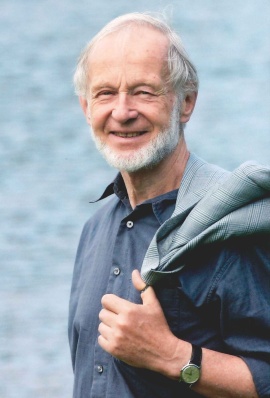
Horst Walter (Editor)
Dr. Horst Walter, born in 1931 in Hannover, studied musicology, German and philosophy at the University of Cologne. In 1962 he completed his doctorate with a thesis on the musical history of Lüneburg and that same year became a research associate at the Joseph Haydn-Institut.
From 1992 until his retirement he was its Head. He made numerous contributions to Haydn research, including articles of a biographical documentary and bibliographic nature. Horst Walter died on 4 April 2016.
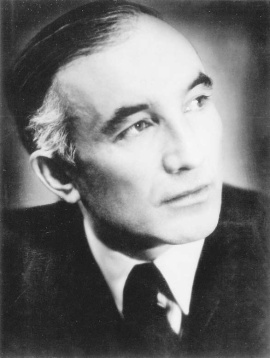
Hans-Martin Theopold (Fingering Piano)
Prof. Hans-Martin Theopold, was born to a pastor’s family in Detmold on 22 April 1904, the youngest of five children. Even as a child he often played the organ in the “Marktkirche” and soon began to take piano lessons with Theodor Vehmeier. At the age of 17 he made his debut at the Landestheater in Detmold with Ludwig van Beethoven’s Piano Concerto in C major under Friedrich Quast (Herford). Following the successful completion of his schooling at the Gymnasium Leopoldinum in Detmold, he went on to study music and piano (main subject): from 1922–23 at the “Württembergische Hochschule für Musik” in Stuttgart (with Max Pauer, 1866–1945) and then from 1923–1928 at the “Staatliche Akademische Hochschule für Musik” in Berlin-Charlottenburg (with Richard Rössler, 1880–1962, and Waldemar Lütschg, 1877–1948). After completing his piano studies (graduating with “very good”) in 1928, he began an active solo career both at home and abroad (USA, Switzerland, Scandinavia, the Baltic states, the Balkans). As a member of the Chamber Music Association of the State Opera in Berlin (from 1933) he also gave countless chamber music concerts, including ones with his violin partner Gustav Havemann (1882–1960).
In the 1930s, audiences and the press alike raved about Theopold’s extraordinary gifts as a pianist: “This young player has it in him to soon become one of the best players in Germany. A superior technique, a wonderful singing piano tone, the strength of a Titan, but not at all hard due to the incomparably gentle elasticity of his touch” [Münchener Zeitung, 21 November 1933]. – “H.M. Theopold gave convincing proof of his splendid pianistic ability in an extremely gripping sonata with a modern idiom by Alban Berg, but predominantly in Schubert’s […] Wanderer Fantasy, which he played with a polished technique and creative power” [Weser-Zeitung, 21 December 1932]. Theopold was awarded several prizes, including the “Grotrian-Steinweg-Preis” in 1928.
In 1937 Theopold became a teacher for the piano (main subject) at the “Bayerisches Staatskonservatorium der Musik” in Würzburg. In 1939 he married Irene Tatjana Wülfing, who was from Moscow. From 1943 he became head of the piano master-class at the “Nordische Musikschule” in Bremen, although this was interrupted by the events of the war. Following his return from a prisoner of war camp, Theopold gave concerts and taught although he did not hold a permanent position. From 1955–1956 he was acting head of the piano master-class at the “Bergisches Landeskonservatorium” in Wuppertal, finally being appointed Professor for Piano on 1 April 1956 at the “Staatliches Institut für Schul- und Volksmusik” in Detmold, later at the “Nordwestdeutsche Musikakademie Detmold” (today “Hochschule für Musik Detmold”), where he taught for decades. On 30 September 1969 he retired. “His students extol his pedagogical gifts. […] Humour, charm, helpfulness and kind-heartedness moderate the strictness of his professional ethos as a musician and teacher” (Lippische Rundschau, 23 April 1969; see also: Lippische Landeszeitung 22 April 1969 on the occasion of Theopold’s 65. birthday: “Prof. Theopold, a modest but at the same time energetic man, is an enthusiastic teacher”). Theopold died in Detmold in 2000.
Contact with Günter Henle was established directly after the publishing house was founded, when Theopold thanked the publishers with great enthusiasm for its first Urtext editions. His extensive correspondence with the publishing house was bequeathed to the Lippische Landesbibliothek in 2014 to ensure its long-term accessibility to the public. The letters testify not only to Theopold’s great interest in musical sources and text questions but also to his initial strict refusal (!) of fingerings in text-critical editions such as these: “For fingerings are and remain something individual no matter what their quality” (letter to Günter Henle from 26 May 1949 {publishing house archives}). Günter Henle was not, however, to be swayed and stressed the necessity of fingerings in his Urtext editions: “It is better to publish the Urtext […] with fingerings that are not necessary for a few individuals, or that might even, I admit, be considered irritating here and there” (letter to Hans-Martin Theopold of 17 September 1953).
It was only in 1955 that Theopold accepted Günter Henle’s offer of contributing fingerings for an Urtext edition that was in the process of being prepared by way of trial. (HN 74, Schubert, Complete Dances for Piano, Volume 1). Following this, Theopold was commissioned to write the fingerings for nearly all of the publishing house’s new editions in quick succession. Günter Henle, himself a good pianist, greatly valued Theopold’s fingerings, and also the many suggestions regarding the musical text in question. In addition, Theopold was always very reliable, thorough and conscientious – something that is not unimportant with editorial work!
Thus to date Hans-Martin Theopold has provided the fingerings for the greatest number of Henle Urtext editions by far – 226 editions (!) in total.
We would like to thank Mrs Margot Theopold and the Hochschule für Musik in Detmold for their great support in providing biographical material.
G. Henle Verlag
Product Safety Informations (GPSR)

G. Henle Verlag
Here you can find the information about the manufacturer of the product.G. Henle Verlag e.K.
Forstenrieder Allee 122
81476 München
Germany
info@henle.de
www.henle.com
(...) sehr schönes Druckbild, gut lesbar, einladend zum Spielen, zuverlässiger Notentext. Eindeutige Empfehlung.
Kirchenmusik im Bistum Trier, 2014recommendations
autogenerated_cross_selling
Further editions of this title
Further editions of this title


